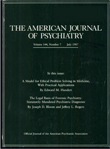Eating Attitudes and Behaviors in 1,435 South African Caucasian and Non-Caucasian College Students
Abstract
OBJECTIVE: The purpose of this study was to examine the presence and severity of eating disorder pathology in students representing South Africa's ethnically and culturally diverse population. METHOD: A questionnaire survey, which involved the Eating Attitude Test and the Bulimic Investigatory Test, was administered to 1,435 South African college students (739 Caucasian and 696 non-Caucasian) from six universities in two urban centers. RESULTS: Black students scored significantly higher than the other ethnic groups on these measures. In addition, a comparable percentage of black and Caucasian female students had scores within the clinical range on these scales. Male students scored consistently lower than female students. CONCLUSIONS: This study's findings challenge the notion that eating disorders are primarily a Western, Caucasian phenomenon and raise the possibility that the risk of eating disorders may increase in developing societies. (Am J Psychiatry 1998; 155:250–254)



